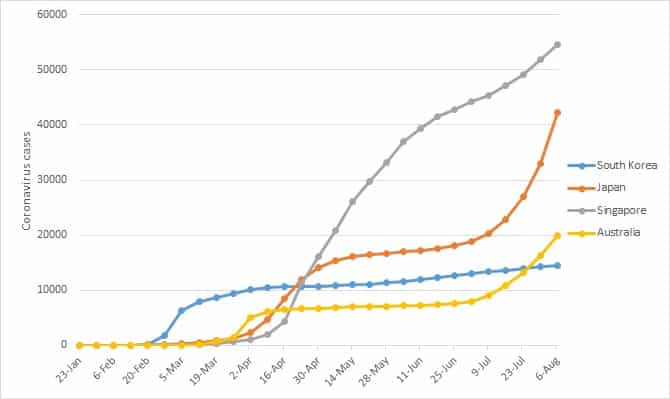The coronavirus disaster is continuing unabated in the US, Brazil and other countries in the Western Hemisphere. These countries’ leaders are either disregarding the welfare of their population, or simply lack the resources to respond effectively to the pandemic.
But how are relatively wealthy and competent countries in the Eastern Hemisphere faring? And facing our current up-tick in cases, what can Australia expect judging by their experiences so far?
To investigate, A Rich Life charted case numbers in South Korea, Japan and Singapore since the start of the pandemic. The figures show both how easily the virus can get out of control, but also that with the right action, it can be brought under control.

As you can see, South Korea, Japan and Australia have all seen cases accelerate, but then almost entirely stopped. This capacity to put the brakes on the pandemic is now being put to the test again in Australia and Japan.
But what about Singapore? As A Rich Life reported in March, Singapore was initially faring better than any other exposed country, including Australia. However, they’ve faced a steep spike since mid-April. So what happened?
The answer is that infections took off among Singapore’s migrant workers. As Dr Sallie Yea of La Trobe University describes it, “The institutionalised neglect of the country’s 300,000-plus migrant workers […] lies at the heart of explanations for Singapore’s COVID-19 crisis.”
Migrant workers in Singapore face appallingly cramped, sub-standard and filthy accommodation. Moreover, they face the threat of deportation if they become sick or injured so that their employer can avoid paying their medical costs.
Though not as openly as Singapore, Australia also has a significant migrant worker population. One report suggested there may be 100,000 migrants working here in illegal conditions.
With no eligibility for JobSeeker or JobKeeper, are migrants in Australia really going to stay home whenever they have a cold or a cough? The Thai Rock and Cedar Meats clusters suggest that they won’t.
The Morrison government declined to extend coronavirus support payments to migrant workers and international students, no doubt eyeing the small financial upside this gave its budget. Was it really worth increasing the risk of a second wave to save a few billion?
The migrant worker outbreaks illustrate a more general point. Coronavirus spreads not only when people don’t self-isolate, but also when they can’t. It spreads when they can’t access healthcare, and when they can’t afford to stay home from work.
A system of first- and second-class citizens is a weaker system. To face the pandemic effectively, we need to all be in this together.